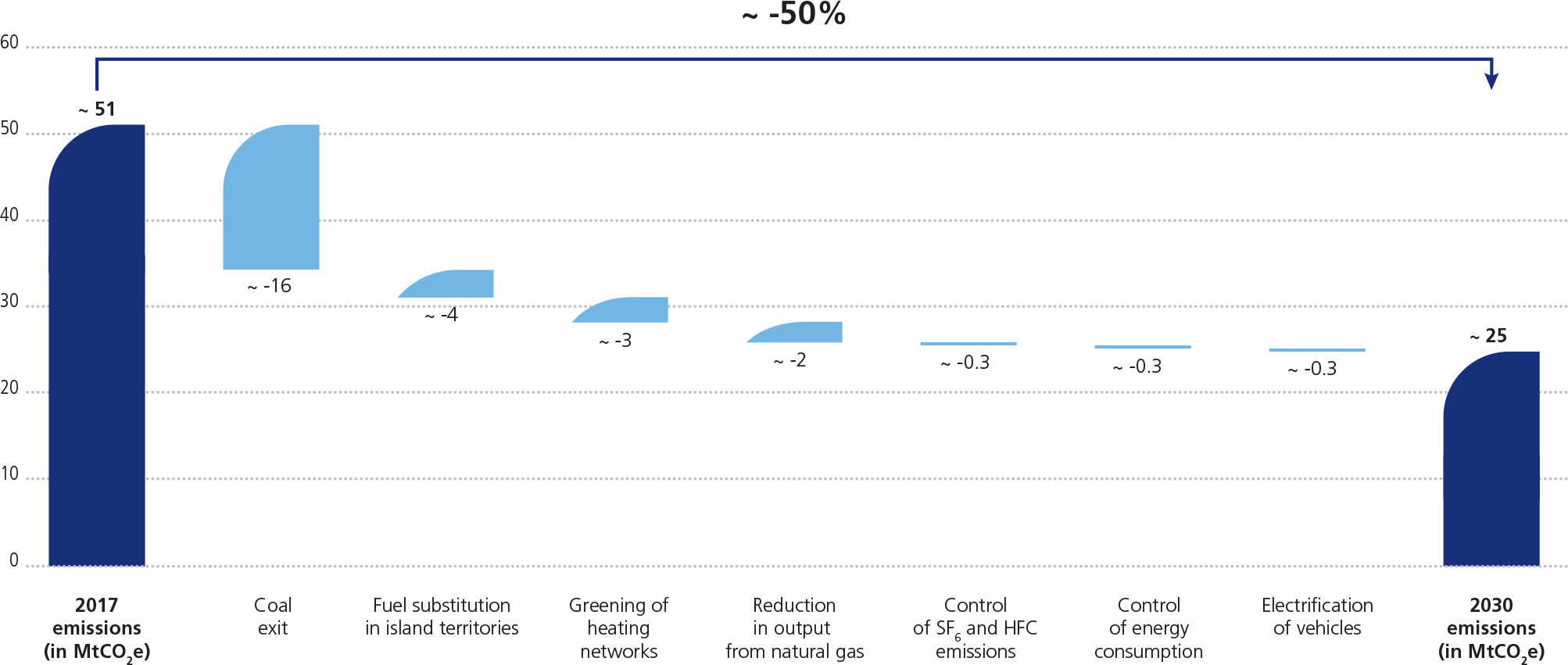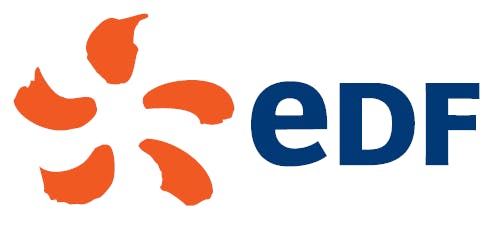These 2023 and 2030 Group direct and indirect emissions targets were used to determine emission trajectories for all the Group’s business lines and entities (see section 3.1.3 “EDF climate governance”).
Main measures implemented to achieve this ambitious goal:
By 2030, and in line with the CAP 2030 projects, the main actions enabling the EDF group to achieve these emission targets covering all three Scopes are as follows:
Impact of our actions on the reduction of the Group's direct GHG emissions (SCOPE1)

This graph shows the impact of our actions on the reduction of the Group's direct GHG emissions (SCOPE1).
2017 emissions (in MtCO₂e): approximately 51
Coal exit: approximately -16
Fuel substitution in island territories: approximately -4
Greening of heating networks: approximately -3
Reduction in output from natural gas: approximately -2
Control of SF6 and HFC emissions: approximately -0.3
Control of energy consumption: -0.3
Electrification of vehicles: approximately -0.3
2030 emissions (in MtCO₂e): approximately 25
Between 2017 emissions and 2030 emissions there is a decrease of approximately -50%.
Coal-fired power generation, currently representing 0.4% of the total power generation, to be reduced to 0 by 2030
The EDF group is implementing its commitments by closing down coal-fired electricity generating plants. In 2019, the Group committed to ending all coal-fired power generation by 2030 across all geographical zones (see section 3.1.1.3.1 “Coal-fired power generation”, which accounts for 0.4% of total generation, reduced to 0 by 2030).
A regulated and limited functioning in the long term: In 2020, coal-fired heat and electricity generation accounted for 0.5% of the EDF group’s total in 2022 output. These generation assets are used only during so-called “peak” periods and energy market crises (1), as was the case for winter 2021-2022 and the coming winter 2022-2023. In France, in accordance with Article R. 311-7-2 of the Energy Code, carbon-fired power generation facilities must not exceed a set emissions limit. To cope with supply issues due to the economic situation, Article 36 of Act 2022-1158 of 16 August 2022 introducing emergency measures to protect spending power and its implementing Decree 2022-1233 of 14 September 2022 temporarily adjusted emissions limits for these generation assets. Accordingly, in case of increased use of coal-fired thermal generation systems, the operators of these facilities must offset any excess emissions due to the increased limit. This offsetting requirement takes the form of a one-off payment of €40/t of CO2e emitted to a carbon offsetting fund. The purpose of this fund is to finance greenhouse gas reduction or capture projects in France (see in section 3.1.1.6.1 “Policy”-“EDF’s offset fund”).
Energy transition in island regions
Corsica and the French overseas territories, as Non-Interconnected Zones (NIZ) in terms of the mainland power grid, are covered by specific Multi-Year Energy Programme (PPE), which set ambitious low-carbon and energy independence goals for them (energy independence of overseas territories by 2030 and Corsica by 2050). Among other measures, the EDF group is progressively replacing fuel oil with liquid biomass and shutting down both Combustion Turbines (CT) and the oldest motors (see section 3.1.1.3.2 “Energy transition of island regions”).
Greener heating networks
The EDF group, through its subsidiary Dalkia, manages over 330 urban heating and cooling networks. Dalkia has set itself the goal of achieving 65% renewable and recovered energy in its heating networks in France by 2026 (see section 3.1.1.3.3 “Greener heating networks”).
Low-carbon thermal energy
Gas activities account for a significant share of the EDF group’s GHG report, particularly through three activities: production of electricity from natural gas, production of heat from natural gas, and sale of natural gas to end customers. Because natural gas emits approximately two times less CO2 than coal, and enables the production of electricity that can be managed ahead of time, it can play a role in the energy transition of some countries, like Italy where it replaces coal. The EDF group has defined a set of internal criteria in order to align its gas business with its climate-related commitments:
- All EDF group’s gas activities fit into the carbon trajectories (covering both direct and indirect emissions) set for each of the Group’s entities in line with the Group’s 2030 goals. All development projects must demonstrate a contribution to the energy transition of the relevant regions and their business plan must ensure compliance with the Group’s 2050 carbon neutral target.
- No development of new gas projects (Combined Cycle Gas – CCG), unless the project contributes to reducing the carbon intensity of the country’s electrical system or further secures its supply. Whenever technically and economically feasible, the project must use solutions designed to reduce its direct emissions, such as green gas, hydrogen or carbon capture and storage (see the EDF group “low-carbon thermal” project below).
- The EDF group helps its gas customers to shift to energy savings, energy efficiency and a reduction in their emissions through its products and services, expertise and specialised subsidiaries. It develops and encourages alternative solutions to fossil fuels whenever available (low-carbon electricity, heat pumps, renewable gas, renewable heat etc.).
- The EDF group supports the development of the biogas sector whenever a project’s business model is viable in the long term. It does so mainly through its subsidiary Dalkia, which operates in biogas production, processing and recovery activities, both for cogeneration and direct reinjection into the natural gas distribution network.
- Finally, the EDF group is constantly working to optimise the energy and environmental performance of its fossil fuel-fired fleet in order to reduce its CO2 emissions, as well as to provide more services to the electricity system. (See section 3.1.1.3.4 “Low-carbon thermal energy”).
(1) The Conseil constitutionnel (i.e., French constitutional council) authorises increased fossil fuel-fired power generation facility emissions limits only in case of a serious threat to power supply security (Decision 2022-843 DC of 12 August 2022).
